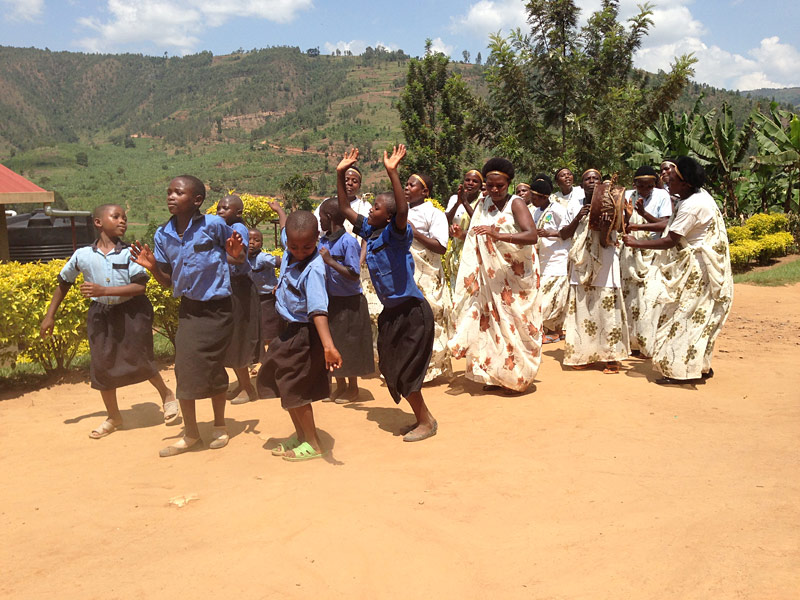
Emily and Sarah Nuss, co-founders of "Kids Connect" and members of World Connect's Youth Advisory Board, spent Summer 2012 in Rwanda, volunteering with an organization called" Spark MicroGrants. This blog is a conversation between Emily (currently in her third year at Middlebury College in Middlebury, VT), Sarah (currently in her first year at Duke University in Durham, NC), and Patrick Higdon, World Connect's Program Manager, who recently spent three weeks in Rwanda participating in a project management training and working with local leaders from four World Connect projects. It's meant to provide a view from the field, working on grassroots development projects in Rwanda.
Why do you think it is important for World Connect to be working in Rwanda? - Written by Emily Nuss on February 8, 2014
Looking back at the state of Rwanda right after the 1994 genocide, including the nearly 1 million deaths, the lack of infrastructure, the instability, and the poverty, it would have seemed unlikely for the country to make such a drastic turnaround. However, Rwanda has clearly demonstrated its resilience as one looks at the current state of the country, especially the health sector. Through the efforts of influential leaders, including President Paul Kagame and Minster of Health Agnes Binagwaho, Rwanda has successfully addressed many issues following the genocide and rebuilt the country's sense of unity.
World Connect has the opportunity to contribute to these achievements by working with Peace Corps Volunteers and community leaders. This is an excellent strategy to reproduce the success Rwanda has shown in its health system to other sectors at the core of World Connect's mission, including economic development, women's empowerment, agriculture, and education. Rwanda has demonstrated the ability to recover from such a tragic and influential event given the appropriate resources and dedication. This is why it is so important for World Connect, with its focus on community driven development, to be working in Rwanda. World Connect has the ability to provide marginalized communities with the tools they need to address their most pressing issues. 2014 is the 20th anniversary of the genocide, but it also represents significant and sustainable progress in Rwanda.
Reply, written by Patrick Higdon on February 10, 2014
Emily, fantastic response. I think one of the most important things that you're alluding to in your response is that Rwanda has been extremely successful at forging development partnerships at the macro level, working side by side with major international development organizations and institutions, such as Partners in Health, USAID and DFID. The government has used its development partnerships to design impressive projects in multiple sectors, including health, agriculture, and the others that you mentioned.
While I was in Rwanda this January, I had the opportunity to sit with members of Parliament and with a number of government ministers, including the Minister of Health and the Minister of Youth and ICT, all of whom spoke eloquently about development partnerships. They also spoke about the importance of Rwanda increasing its own investment in major development projects, thus reducing its dependency on development aid and increasing the country's ownership of its own development future.
This level of commitment is promising but these projects will take a great deal of effort and time before their impact trickles out to the poorest communities. I saw this firsthand as I visited World Connect projects, where folks were struggling to access some of the most basic services, such as clean water, sanitation, and electricity. As you said, there is a natural niche for World Connect in Rwanda, working at the grassroots level alongside local leaders, using the very same vision of successful development partnership that we've seen at the national level.
Can you talk a bit about your experience in Rwanda working on grassroots development projects? - Written by Sarah Nuss on February 13, 2014
Patrick and Emily - I totally agree with what you are both saying. Rwanda's commitment to development has been incredible and I think it is really important that the government is aiming to take ownership of its own development future. Even just the act of creating this as a goal says a lot about the direction that the country has been moving in since the genocide. However, as Patrick mentioned, there are people in Rwanda who need basic services now, and can't wait for the time that it will take for the impact of the national development plans to benefit them.
I think Spark Microgrants, like World Connect, is a great example of an organization working to complement Rwanda's goal for self-led development at the same time as it's working to help people get access to their basic needs. The key to the model is partnership, which is increasingly being recognized as something that is essential for development, even at the grassroots level. Every development project that the two organizations support is a product of community driven ideas and plans in conjunction with organizational support.
It was really amazing to be able to work so closely with this type of model. Much of what Emily and I did involved going to community meetings to see and participate in the pre-project planning and post-project follow-up. I specifically remember going to one community meeting and watching the youth group in the community plan and talk about HIV awareness lessons they wanted to do to support the HIV women's group. This type of excitement and drive comes only from a certain level of ownership and responsibility for the project. On more than just the level of government ownership, I think this grassroots model of partnership and community ownership is something"
